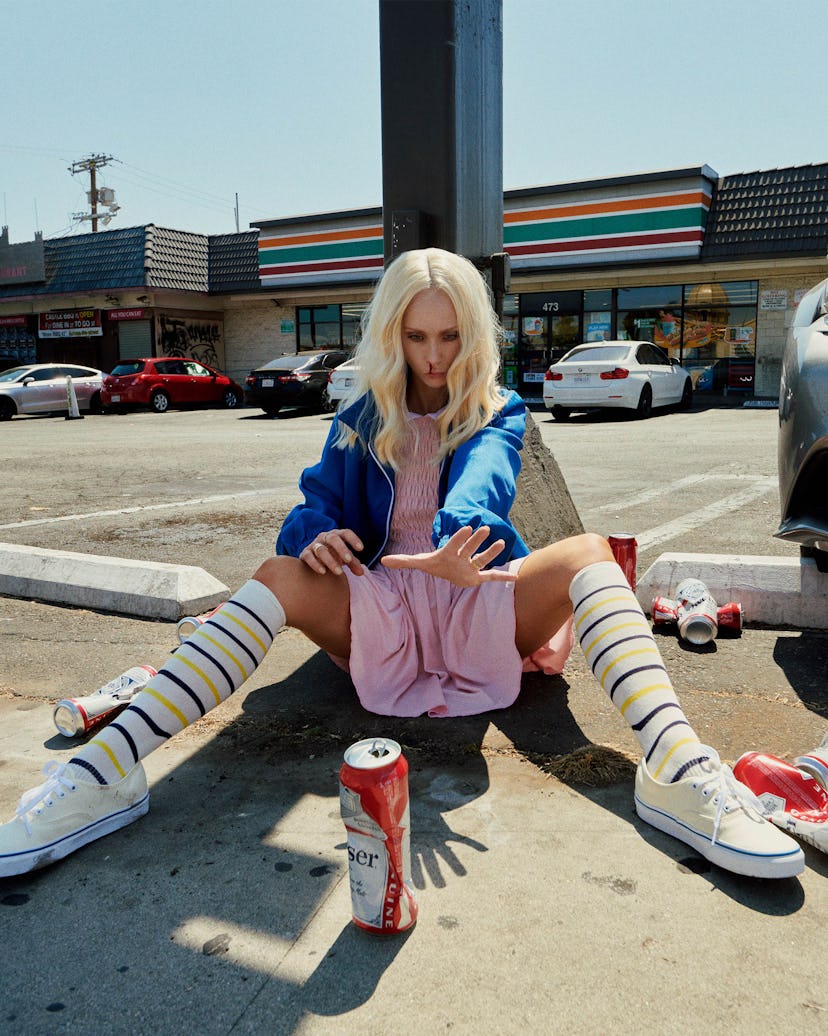For W’s second annual TV Portfolio, we asked 26 of the most sought-after names in television to pay homage to their favorite small-screen characters by stepping into their shoes.
Juno Temple’s involvement with Ted Lasso started with a text from Jason Sudeikis that read, “Hey, I’d love you to read, if you’re interested.” It was a message she initially assumed was a mistake, since the now 32-year-old, who’s been acting since she was a child, wasn’t exactly known for her comedic roles. Nevertheless, she was delighted by the pilot script, and found herself drawn to the series for the same reasons that it’s had a profound impact on audiences: It’s a deeply human story nestled within a workplace comedy that conveys a unique, contagious optimism.
Now, Temple is nominated for an Emmy for Best Supporting Actress in a Comedy Series for her role as Ted Lasso’s Keely. Her upcoming projects include Apple TV+’s Mr. Corman, with Joseph Gordon-Levitt, and The Offer, a miniseries about the making of The Godfather. For W’s TV Portfolio, Temple dressed up as the iconic Stranger Things character Eleven (portrayed by Millie Bobby Brown in the Netflix show). And after waking up from a well-deserved nap on the first day off she’s had in a while, the actress opened up about her obsession with the Stranger Things cast, what makes Ted Lasso so unique, and the challenges of performing comedy as a dramatic actor.
Juno Temple as Eleven from Stranger Things. Photographed by Christian Högstedt
When did you first get into Stranger Things?
The minute it dropped on Netflix, I watched the whole season in probably 24 hours. I literally didn’t sleep in order to finish it, actually. I was completely besotted by it and the homage to this incredible ’80s fantastical world and the beautiful friendships between these children. It reminded me of Stand By Me, a film I really loved. There’s something about the American childhood that is just so very different to what I grew up with that I find deeply fascinating. These kind of icicle, starlit nights—there is something magical in a way that I haven’t experienced before.
The Stranger Things kids are now some of the most famous people on the planet. You also started acting when you were young. How do you think you would have handled fame on that level when you were younger?
My god, I take my hat off to them. I think I’d be dead. I don’t think I would have handled that really well. I’m sure if you worked with them as an adult in the first season, you would be amazed by their wisdom, and also their childishness. That’s why kids disarm us so much, because we forget about our raw, natural wisdom and belief in magic.
Like Stranger Things, Ted Lasso has also become widely popular. What do you think makes it so appealing to such a massive audience?
I think people are still keen to be surprised. Ted Lasso really, really did that on many levels, even with the fact that each character, from the minute you meet them, is very different from who they are at the end. It’s a reminder of the fact that humanity can be kind. You can turn people around. You’re in control of what you do. You can’t control anybody else, but you can be a positive person. I think that was a message that people needed reminding of a long time ago, and need it now.
Your character, Keeley, is such a good example of that. What drew you to playing her?
[Jason Sudeikis] told me a bit about Keeley’s character arc and the show in general; he described it as wanting to try to marry the English Office and Friday Night Lights. I was like, “Whoa. Oh my god, that is so tight. Do you think we can do that?” He was like, “I don’t know. It’s a big ask, but I want that kind of human rawness mixed with that kind of genius comedy.” And I was like, “If you can do that, that’ll be really cool.”
Which one do you find more challenging, comedy or drama?
The idea of matching to the comedic talent that is in a show like Ted Lasso is much more intimidating to me, because that doesn’t come naturally to me. Comic timing is an art in itself, like being able to write a song; it’s a rhythm that I don’t naturally know. The rhythm can be sort of taught, but at the same time, I want to let other people do it, and then I’ll fall into place. The joy with Keeley is that she is very honest with everything she does. Sometimes that’s really funny, because sometimes she doesn’t understand what’s going on around her. Just by playing her as humanly as possible, that’s where I have fun. That’s where her humor is coming from. But big jokes—the big, heavy-hitting genius lines and stuff so terrified me. They belong in the mouths of all the true comedians on the show.
